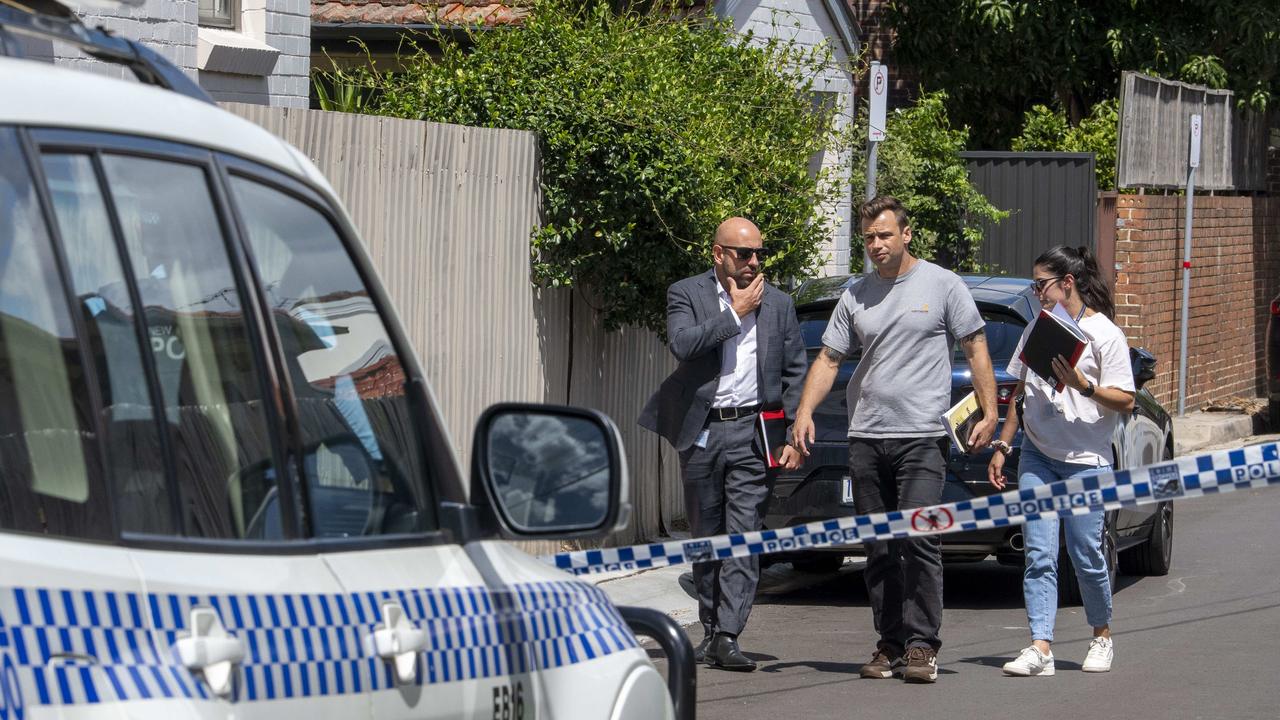Families of Jack de Belin and Callan Sinclair say their sons never had a chance of a fair trial
The families of Jack de Belin and Callan Sinclair say their sons were ‘assumed guilty from the start’ after they were charged with rape in 2018. For the first time they talk about the police investigation and why they want a judicial review.
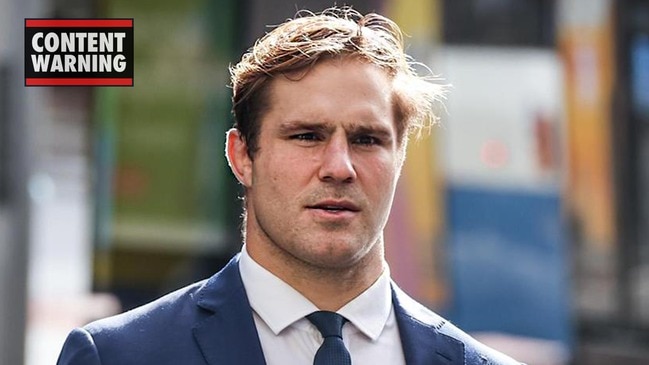
NSW
Don't miss out on the headlines from NSW. Followed categories will be added to My News.
Cathy de Belin believes her family has paid dearly for her son Jack’s “moral mistake”. She has trouble putting into words the dread and anxiety she felt when the star rugby league player confessed to cheating on his long-term partner.
However, the pain was paltry compared to the crippling horror she felt when she learned soon after that police had plans to charge her son and his friend Callan Sinclair with rape.
De Belin, whose long-term girlfriend was pregnant at the time, and Sinclair had had group sex with a woman after a night out at a nightclub. They claimed it was consensual. She accused them of sexual assault.
Both Cathy de Belin and Callan’s mum Gai Sinclair were convinced their sons’ arrests had been a huge, horrible misunderstanding – that police would “sort it all out” and this nightmare would be over.
“How wrong we were,” Cathy says.
“These boys were assumed guilty from the start,” Gai says. “We feel strongly that at no point was the truth of the matter ever in play.”
Through two high-profile rape trials, which both ultimately ended with hung juries and the charges withdrawn, Cathy would tell herself that it didn’t matter what other people were thinking.
“God knows who we are and exactly what did happen. He will be the one who ultimately judges each and every one of us,” she says.
In this case, the de Belin family believes there were other factors at play.

The families agreed to sit down and talk to Sydney Weekend because they have no doubt their boys were seen as famous scalps. Cathy believes in her heart her NRL star son never stood a chance of getting a fair trial.
The case was put together against a backdrop of heightened sensitivity in the community. For too long women had fallen victim to a justice system heavily weighted in favour of the accused and the #MeToo movement and other high-profile cases had changed public sentiment and seen the scales starting to rebalance. And when you throw in the fact de Belin and his co-accused were rugby league players on a night out on the town the case became more complicated.
It became difficult to contain the speculation and the rush to judgment in a community already angered by the broader injustices when it came to the treatment of women.
“The hardest of campaigns was driven to incarcerate two innocent men, one of whom made a moral mistake only,” Cathy says.
The day de Belin was charged, December 13, 2018, Cathy and her husband “went into shock and had a meltdown”.
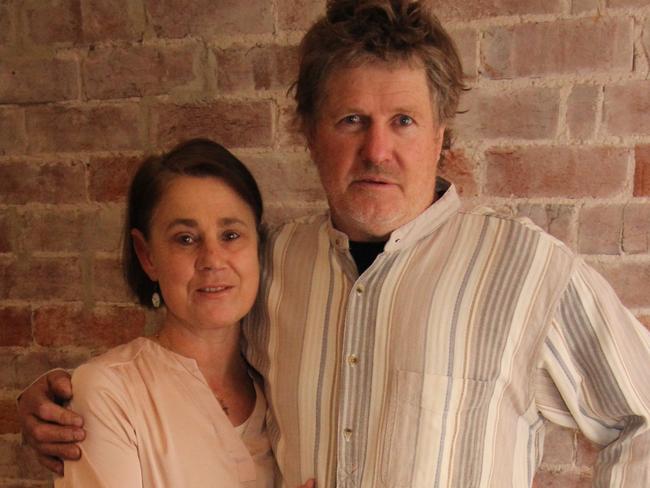
“We could not believe this was happening. It was like being thrown into a pressure cooker,” Cathy says.
The following day they woke to camera crews outside their home in Cootamundra, a small country town in southwest NSW.
“I did not answer the front door and then they walked down the side of our house to enter our back yard and our dogs barked and they left. This made us very anxious and it was a huge invasion of our privacy.
“They then set up cameras across the street. They were there most of the day until our policeman neighbour moved them on.” De Belin meanwhile was on the phone to his sister abroad, shocked by the allegations levelled against him and Sinclair.
Phone transcripts played in court proceedings showed both men talking to family members and friends, adamant the sex was consensual. They were also recorded speaking to each other, agreeing that if they told the truth they would be fine.
De Belin’s mum says her son “did the wrong thing but he did not commit a crime”.
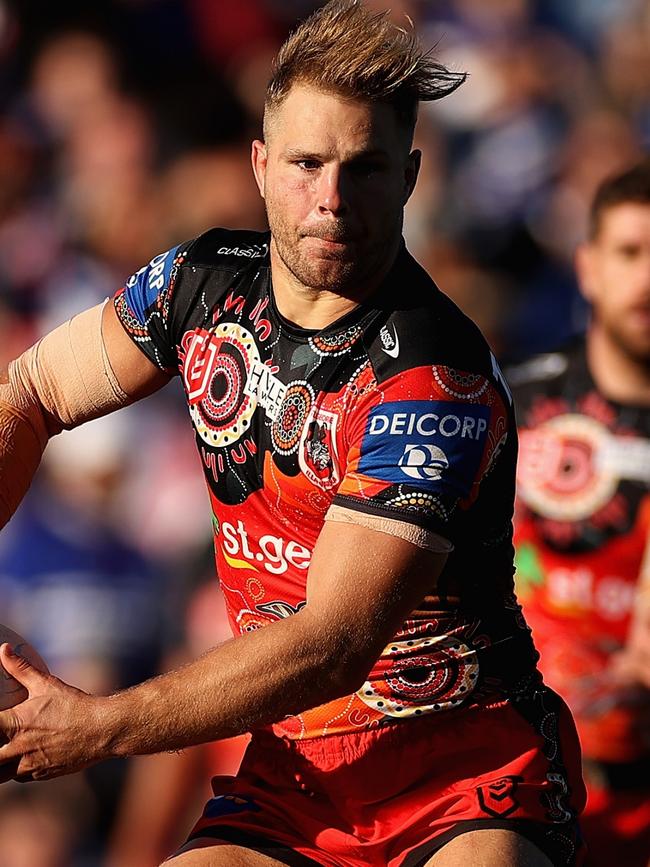
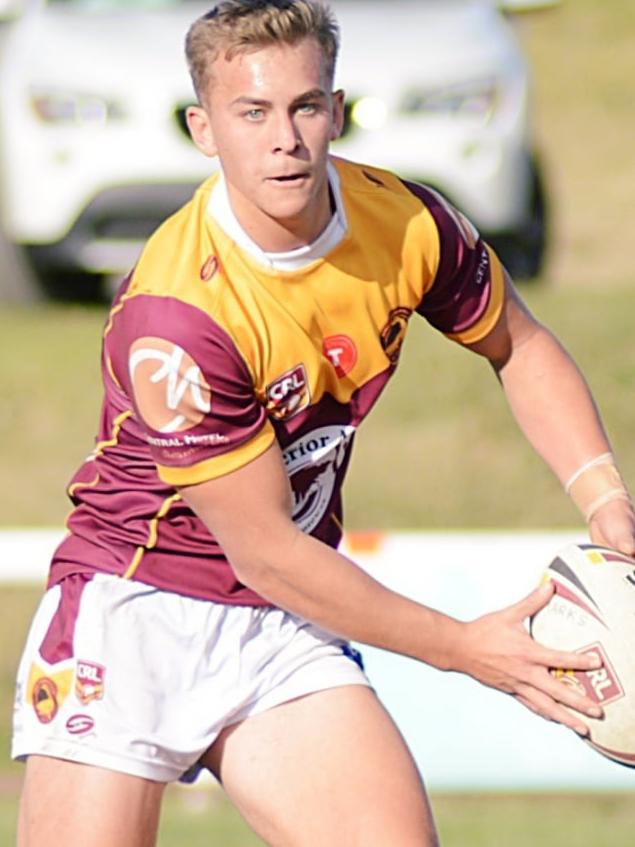
“We all make mistakes, we are human, silly to think we don’t and won’t. But the truth always comes out. If not in this lifetime, it will be our next,” Cathy says.
In an emotional letter hand delivered to Wollongong police station, where de Belin and Sinclair were fingerprinted and charged with aggravated sexual assault, Cathy expressed her anger and despair.
“It appears on many occasions there were things that were leaked between your organisation, the press and the NRL,” she wrote to police after the completion of all court proceedings.
“These actions made it impossible for our boys to get fair trials. This is the act I am struggling to forgive the most.”
She insists the concerns are not isolated to a mother desperate to protect a son – she says she would “do the same for a stranger on the street if he had been treated this way”.
THE NIGHT IN QUESTION
The woman met Jack de Belin and Callan Sinclair in Wollongong on the night of December 8, 2018. It was the annual Santa Pub Crawl. The trio left the Mr Crown hotel, a popular night spot, in the early hours of the morning and the woman told police she thought they were on their way to another nightclub before stopping into a North Wollongong unit, which belonged to a cousin of Jack de Belin.
The woman said the men assaulted her, ignoring her protests.
The men both testified the sexual encounter was consensual, with the woman acting “normal” and “appearing to enjoy it”.
The court has heard after the incident that de Belin, Sinclair and the woman caught an Uber together back into town and lined up at another night spot, Fever nightclub, but never went inside. CCTV footage shows it was about 2am. According to evidence given in court, the woman is seen laughing with the two men and then she leaves.
The court heard they were seen in the car together by a mutual friend of the woman and
Sinclair. The woman later texted the friend to say she had been “abused sexually”.
THE FIRST TRIAL 2020
De Belin and Sinclair each pleaded not guilty to five counts of aggravated sexual assault.
Two years later the pair faced a four-week trial which ended when the jury declared it was unable to reach a unanimous verdict on the charges against them.
The pair claimed the encounter was consensual while the woman said it was anything but. She said she thought the trio were on their way to another nightclub before stopping into the North Wollongong unit so de Belin could charge his phone.
However, internal police documents obtained by subpoena showed the woman initially told police that the three went to the apartment because de Belin and Sinclair wanted to get changed before going to another nightclub.
According to Jack de Belin’s lawyers this was a “fundamental shift” in the woman’s evidence.
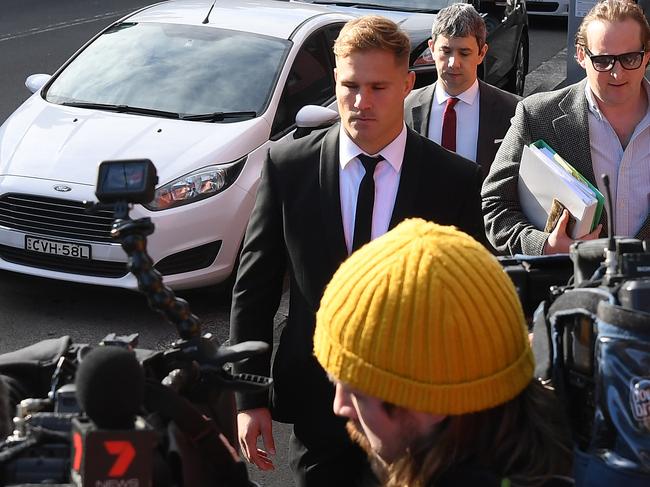
Both men chose to give evidence in their defence case. They said the woman had consented.
The defence case was that the woman winked and smiled at de Belin when he suggested a threesome following her flirtations with Sinclair. They argued in court the woman had wanted to “stop the rumour mill” after she was seen in the car with the “very prominent” footballer (de Belin) after the incident so she accused them of sexual assault.
Crown prosecutor David Scully claimed the men hadn’t planned to rape the woman before arriving at the unit, but a “fundamental disconnect” between them meant they were at odds with what was to happen.
The presiding Judge Andrew Haesler gave the jury the option to return a “majority verdict” whereby 11 out of 12 jurors could be in agreement. But minutes after considering this option the jury returned once again saying it could not reach a verdict and the jury was dismissed.
THE 2021 RETRIAL
In Sydney in 2021, a second NSW District Court jury found Jack de Belin and Callan Sinclair not guilty of one count of aggravated sexual intercourse without consent. But after hearing evidence for about four weeks the jury could not agree on the five other counts before the court and was ultimately dismissed.
Most sensational in the trial before Judge Nicole Noman was evidence from the NSW Police detective investigating the rape claims admitting he accessed material on the St George Illawarra footballer’s phone, which turned out to be legally protected.
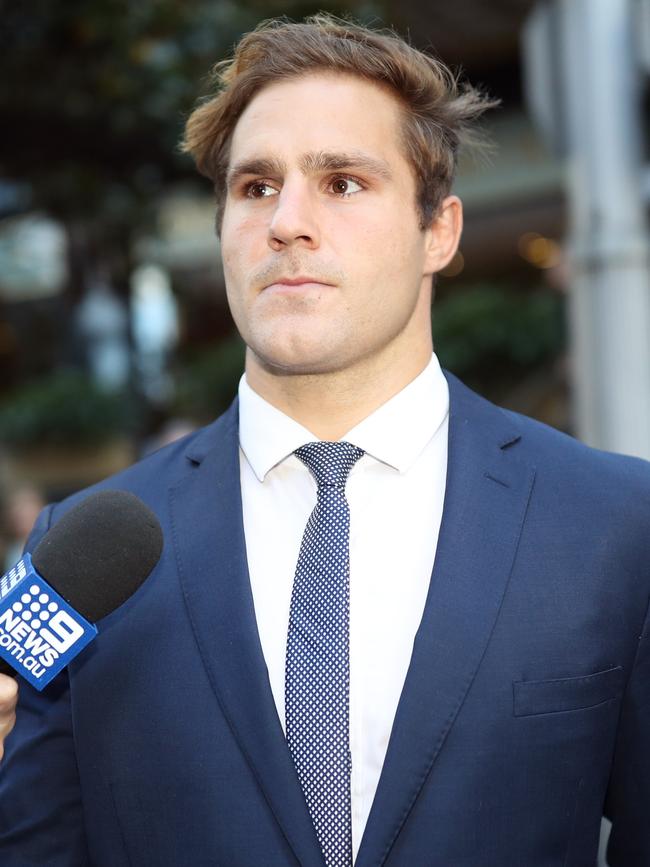
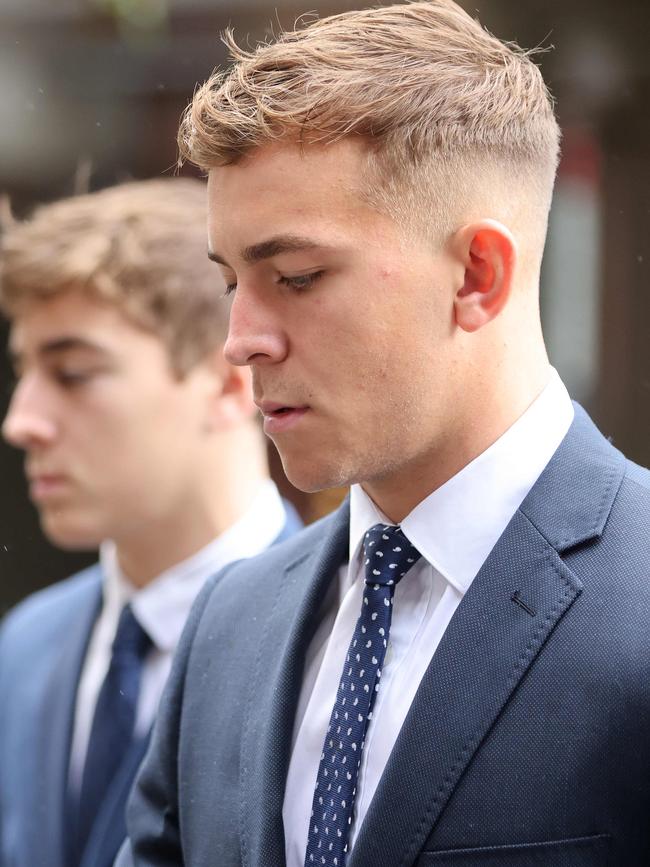
Detective Senior Constable Shawn Adams denied he then used the confidential messages between Jack de Belin and his lawyer to undermine the footballer’s defence.
Under questioning from David Campbell SC, the officer admitted to scrolling through messages from the player’s seized Nokia mobile in December 2019. He denied that he then spoke to de Belin’s accuser about the content of those messages.
Campbell put to Senior Constable Adams: “You were looking through that material … in the hope that there may be in that material something that could undermine the defence of Mr de Belin, correct?” The Senior Constable replied: “It’s incorrect.”
Senior Constable Adams also denied putting aside information that did not fit the accuser’s story. However, he said he failed to disclose inconsistencies in the woman’s narrative before the trial began.
Gai Sinclair says it is important to note the two men’s stories remained the same from day one, they never changed.
“The objective evidence throughout both trials supported the men’s version of events. That’s because it was the truth.”
Campbell described the officer’s conduct as a gross departure from police procedure by not taking any notes of the first 90-minute conversation he had with the woman making the allegations.
“You knew full well as a police officer, your obligation is to make a record of a complaint received from a citizen,” Campbell said. “Yeah,” the officer responded.
The senior constable was also criticised for not separating the woman from another woman who had accompanied her to the police station, as he knew she would later become a key witness in the trial.
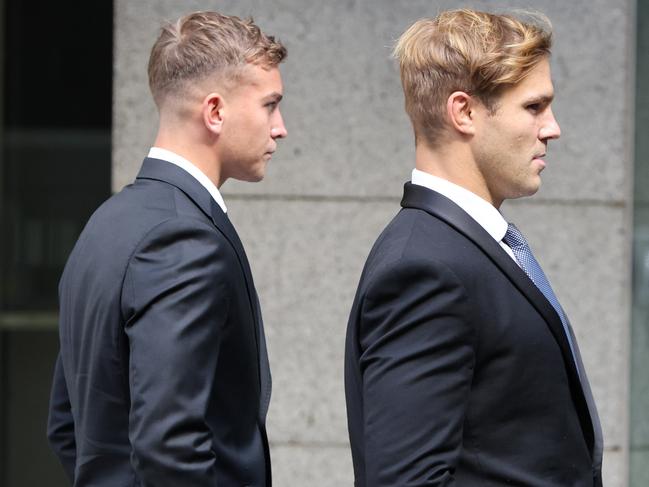
Campbell finally asked the officer if he was a dishonest man.
“No,” he responded.
“You have wilfully lied on oath previously?” Campbell said.
“I am not answering any questions in regards to that,” the officer replied.
Judge Noman told the jury that the senior constable received a certificate preventing prosecution after admitting he lied in the first trial of the two men which could not be concluded.
INVESTIGATION IN SPOTLIGHT
The case almost never made it to trial in the first place with de Belin’s lawyers applying for a stay of proceedings in January 2020.
While the application was eventually denied by Wollongong District Court Judge Haesler, his comments provided a scathing assessment of the early police handling of the investigation. But he decided the importance of the matter going to trial outweighed detectives’ disregard for procedure.
“Police illegality of the type shown here cannot be allowed to end the trial process,” he said.
The legal arguments were the subject of non-publication orders until finally in July last year Judge Haesler’s judgment was published.
Lawyers applied for the stay of proceedings after police seized the phones of de Belin and Sinclair during raids on their homes in December 2019 and January 2020.
Police admitted they accessed text messages and emails between the men and their lawyers which was covered by legal professional privilege and typically cannot be used in proceedings.
When police seized de Belin’s yellow Nokia phone, they made copies of SMS messages between the St George Illawarra back-rower and a person who was listed in the phone as “Craig lawyer”.
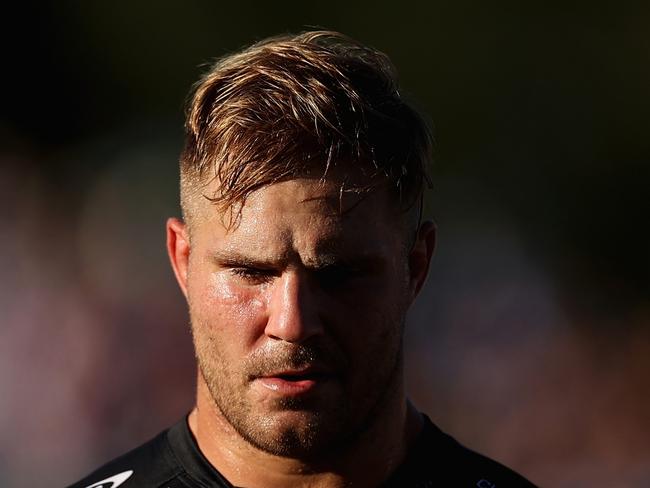
“Craig lawyer” was Craig Osborne, a Dragons board member and a partner at RMB lawyers – the law firm which was representing de Belin at trial.
During the legal arguments over a stay of proceedings, Senior Constable Adams initially maintained he believed the communications concerned “Dragons business”. He then conceded he had lied while in the witness box.
After being granted a Section 128 certificate, which protected him from self incrimination, he admitted he had viewed material which he knew might be relevant to a criminal trial.
“He accepted that he knew that the SMS messages to and from ‘Craig lawyer’ was privileged information that he was not entitled to have,” Judge Haesler said.
When Sinclair’s house was raided, they seized his iPhone, and when it was returned the following day, he said he became suspicious.
He said that when he opened his Gmail account, he saw that his recent emails with his lawyers had been viewed, adding that he had not looked at that correspondence since he sent it.
Police used a program called Cellebrite to download all information on the phone, which was then transferred on to a USB stick.
In late January 2020, a solicitor at the Office of the Director of Public Prosecutions looked at the contents of the USB device, however the viewing was described as “limited” and “scrolling”.
De Belin’s lawyers argued that the viewing of the legally privileged material had the potential to infect the upcoming trial. His barrister David Campbell argued: “We don’t know how far the poison has spread.”
He said the material was used to explore new avenues of investigation which gave the Crown prosecution an advantage at trial.
Judge Haesler said that legal professional privilege was a fundamental right and a cornerstone of the legal system.
He was also scathing of the police conduct.

“Adams lied to the court in his affidavit, in his evidence in chief and in his cross-examination, immediately prior to his receiving the Section 128 certificate,” Judge Haesler said. “He admitted as much. The lies are also obvious when viewed with the objective evidence.”
Judge Haesler accused Senior Constable Adams of acting with “reckless disregard” for legal professional privilege and said he should have “benched himself” from the investigation.
“Whether as a result of brain fade or overzealousness or a simple cock up, having seized the device,” Judge Haesler said.
“To ‘scroll’ through de Belin’s Nokia phone and the SMS file ‘Craig lawyer’ was ill-judged and reckless and had the capacity to provide an unfair advantage to investigating police.”
However, he ultimately found that the information gleaned, and the search for the witness, was a “distraction” which would have no impact on the trial.
“If the ordering of a permanent stay of criminal proceedings were ever to become other than exceptional, it would not be long before courts would forfeit public confidence,” Judge Haesler said.
Police have launched an internal investigation into the handling of the case, though they have confirmed Adams is the only officer in the spotlight. The Law Enforcement Conduct Commission is overseeing the investigation.
The families and their lawyers believe the scope should be much broader.
In a letter to the LECC in January this year Gai Sinclair wrote: “As public citizens, we request these police officers be held accountable for their actions:
“What processes and inquiries, if any, are under way to uncover the truth of this serious misconduct?
“If there is currently a process in place, why is it taking so long? When can we expect these resolutions to be made? Will your findings be made public?
“What are the outcomes of your Inquiry in regard to prosecution?” To date Gai hasn’t received a response to her questions. She was told the LECC is looking into the matter.
NSW Police have confirmed an internal investigation into the police handling of the case is under way and there is no timeframe on the delivering of any findings.
An LECC spokesman said: “The matter that you have referred to is being investigated by the NSW Police Force and the Law Enforcement Conduct Commission is overseeing their investigation.”
THE TWO MEN SPEAK FOR THE FIRST TIME
In a reluctant interview with Sydney Weekend, Jack de Belin and Callan Sinclair both agree with their closest supporters that the case has ruined their faith in the justice system. They say they felt harassed and intimidated during the investigation.
“You initially think cops are just going to do their job, you tell the truth and everything will be okay but you soon realise that’s not how it goes,” de Belin says.
Maintaining a silence throughout the two trials, de Belin has agreed to speak up in support of his mum’s quest for justice – and closure.
While he has a long list of what he believes is his unfair treatment at the hands of NSW Police, he leaves that to the lawyers.
One incident though upsets him most.

“It was a year after we had been charged and it was six o’clock in the morning. I had just gotten up, I think I had training that day. And there were six or seven cops at the front door.
“Some were detectives, some in uniform and they came in, took my phone, my computer. Worse, they took my partner’s phone.
“She was like, ‘I can’t not have my phone, I need my phone, my daughter is sick.’
“They didn’t care. They just took it anyway. Even though it was a year after they charged me, they came storming into my house at that hour?
“I grabbed my PlayStation to try to use the remote control to get a message to Craig (Osborne) to tell him, ‘Hey the cops are here, speak later.’’’
Legal sources question whether or not police had a “forensic purpose” to seize the phones and devices at that point of their investigation.
De Belin’s lawyers quickly penned a letter to the DPP warning them not to look at any material on the devices as it would be a breach of client-lawyer privilege.
But NSW police officers not only read the messages, they forwarded the messages to the DPP.
De Belin considers the event one of many examples of “dirty tactics” to bring him down.
Both men say they were advised by their lawyers not to speak to police and, despite them wanting to clear things up, tell their side of the story, “the truth”, they followed the advice.
“We are so lucky we were advised not to talk, because had we talked they would have twisted our words,” de Belin says.
“We saw that happen all the way through this.
“You think that you can tell the truth and everything will be OK. But that’s not how this all worked.”
Sinclair, the less recognisable defendant in the headline-grabbing saga, had been selected to play in the UK when he was charged by police.

As he sat face-to-face with Senior Constable Adams in Wollongong police station, DNA swabs taken and fingers inked for his prints, he was confident everything was going to be “sorted out”.
“They make you feel like they believe you. If you tell the truth it will all be straightened out.
“I remember three days before they came and took my phone, it was New Year’s 2020, before the first trial.
“They rang me and said, ‘Hey mate, just seeing how you’re going, just updating your change of address.’
“Then three days later they turn up and seize my phone.
“They took Jack’s in mid December, then waited all that time to get mine. They had it for a day and then when I got my phone back I noticed my emails were open.”
But what irks the 25 year old the most is the conversation he had with police before the recording equipment was turned on.
“He was getting the disk and equipment ready, sitting there on the other side of the table, and he made conversation like, ‘Oh this is all a bit of a shame. I’m a big Dragons fan, Jack was gonna have a brainstorming season for the Red V,” Sinclair recalls.
“I wasn’t saying much back … he was talking about my passport. I was supposed to go to England in May and play for Norway and he said, ‘You should be right by then, you should get it back by then anyway.’
“So from the first day I spoke to the police I thought, ‘OK this is gonna be sweet, they know the truth it will all be sorted out.’”

“But after they charged us it was like they were bending over backwards doing everything in their power to try and get something on us.
“That’s how the whole thing played out really. Once all the trials started it didn’t feel like we were innocent until proven guilty.
“I’m glad I listened to my lawyer’s advice and didn’t speak to the cops because I know now they would have twisted it and used it against us.
“The way we were brought up, Mum and Dad drilled into us that you respect law enforcement and police. I’ve never had a bad attitude towards them, I believe in what they do. But after my whole experiences that’s completely torn apart.
“I lost all faith in their honesty.”
A DAD’S STRUGGLE
Terry Sinclair wanted his boy home for Christmas.
The strict bail conditions placed on the 21 year old while he waited for his trial meant leaving the Illawarra and travelling home to Merimbula was impossible.
Terry called Wollongong Police Station asking for a change to the reporting conditions and found himself talking to the police officer who interviewed and arrested his son.
After some pleasantries and discussion over altering the bail conditions, the police officer said he couldn’t see a problem with changing reporting days.
It was what the officer said next that stopped Terry Sinclair in his tracks.
“He told me he ‘had a lot of pressure on him from above’, I presumed he meant he was under pressure to dot the Is and cross the Ts and make sure they were thorough,” Terry tells Sydney Weekend.
“We took some comfort in that, but obviously that’s not what happened. We were thinking that when they investigate it properly they will see that it’s not true and it will get thrown out and all be over.
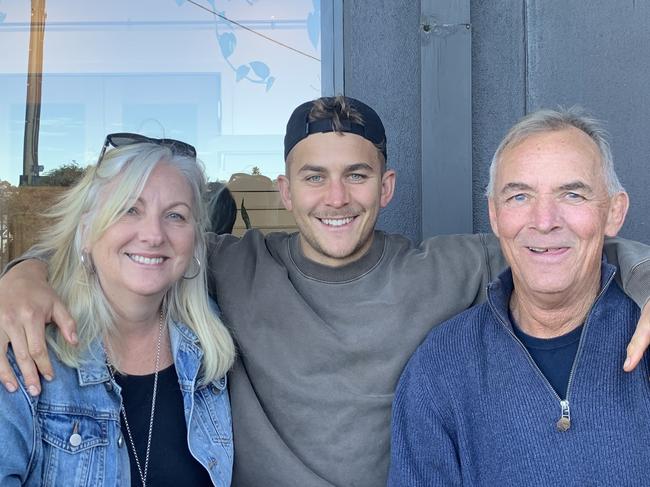
“Our hope was that it would be seen for what it really is and that would be the end of it.
“But now when we think about that conversation – the pressure was from above to get a conviction no matter what.”
Terry says the officer told him he wished he hadn’t been working on the day the allegations were made against de Belin and Sinclair.
What the officer said gave him a slight sense of hope that this horrible mess would be sorted and everything was going to be okay.
Terry, who has gone through his own health battle during the two-year ordeal and was forced to sell the family home to cover legal costs, says the fact that police were found to be dishonest during the court proceedings confirmed his suspicions that the system would fail his boy.
“Here we have a police officer admitting to lying under oath. You teach your kids to respect police, to respect authority, then this happens.
“Police officers knowingly went after two innocent men and need to be held accountable.”
FAMILIES DEMAND REVIEW OF JUSTICE SYSTEM
In 2020 before the first trial commenced, defence lawyers applied for a stay of proceedings.
“Our lawyers argued the privilege breach meant the trial should not proceed,” Gai says.
“They thought it would take two or three days to sort out but as the police behaviour came to light the hearing dragged on for the full two week allocation.”
A sticking point for Gai, which she pointed out to the LECC, was the claim that no notes were taken when police interviewed their key witness.
The complainant was interviewed by two police officers for 45 minutes.
“According to the testimony of both officers no notes were taken at this time,” she says.
“Please! This is standard police procedure for even the most trivial incident that any officer would follow in their day-to-day procedures let alone experienced detectives being informed of a crime of such a serious nature. The details of an accusation when first raised is imperative in any case and these detectives well know it.”
When questioned by defence barristers during the trial the complainant and the work supervisor both testified that notes had been taken during that first interview at Wollongong Police Station. “They said they were handwritten, in a book,” Gai recalls.
The complainant’s official statement was completed over the following two days “with no notes taken, no video or audio recordings made, and no other police officer present. Just think about that.”
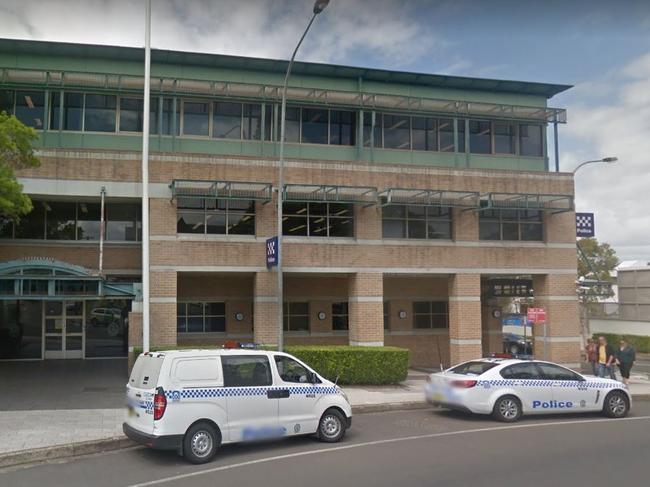
Gai Sinclair says the complainant’s work supervisor who accompanied her to the police station and then later to Wollongong Hospital for examination was present during this entire process and was not separated and interviewed regarding the original account given to her.
“She would have not only heard the first version as given to her, she then heard it again when given to her boss at the restaurant who advised the complainant to go to police, she then heard the whole story again as given at the police station and again at the hospital so that is now a minimum of four times she has heard it,” Gai says.
A witness interviewed by police was not declared to the defence team. “The witness had very important testimony and only came to light later when a new detective came and took over the case,” she says. He appeared and gave important evidence at the trials.
“There are so many actions by the police that need to be looked at. It’s appalling enough that they have behaved in this manner. That there doesn’t seem to be any accountability is just plain unacceptable,” Gai says.
“This must be investigated properly, not swept under the carpet.”
Terry Sinclair is furious about the responses police gave when questioned under oath about why they didn’t follow procedures.
“When another officer was asked why they didn’t take notes, separate witnesses and follow the required procedures surrounding accessing privileged documents, he replied with three words … ‘I just didn’t’.”
“Not good enough,” Terry says.
CLOSURE FOR TWO MUMS
The day after Jack de Belin was charged it was difficult to escape the media hype.
“When you live in a small town and work in retail it’s hard, but through adversity you really do discover who your friends are,” Cathy de Belin says.
“The Cootamundra community was so supportive and sympathetic. We feel blessed to be part of such a supportive community. We received many letters and messages of encouragement for which our family will be forever grateful.”
Once the trials were over Jack de Belin and Callan Sinclair just wanted to get on with life.
Both boys are as close to their families as they always were.

Neither talk much about their two-year nightmare, preferring to look to the future.
De Belin, who was a NSW State of Origin player at the time, was stood down by the NRL under its “no fault” policy, missing two seasons for the Dragons.
He feels forever grateful to St George Illawarra who extended his contract, partly to help pay his $1m-plus legal fees as well as provide for his wife and two children, with the understanding his contract would be terminated if he was found guilty.
He’s now focused solely on his football career and his young family.
The last thing he wanted was to be back in the spotlight, more headlines about his case.
But he knew his mum needed closure.
In her letter to Wollongong Police – which Cathy only recently told her son she had hand delivered some time ago – she said: “Jack knows nothing about this letter, and would have talked me out of sending it. This is not about Jack, but a great need for his mother to be heard.

“Writing this will give me closure and the freedom to move on to have an abundant life free of anger, resentment and pain.”
De Belin says he wants his mum to be able to look to the future too.
For Gai Sinclair nothing about the strong relationship she has with Callan, and all her sons, has changed.
“Nothing is different. The unwavering support from not only our family and friends but also our whole far South Coast community has given us such strength throughout this ordeal,” she says.
“Cal’s local friends, his school community, his old work mates and sporting clubs – their support has never waned. They know us and they know the person Cal is. I’ve had old coaches of his stop me in the street with tears in their eyes offering to write character references for him, anything at all to help. So many people have been affected by this witch hunt, the ripple effect is massive.
“The media circus and relentless social commentary should not be allowed pre-trial, through a trial or at any stage unless there is a guilty verdict. And there were certainly no guilty verdicts in this case.
“How can you possibly engage a fair and unbiased jury? It’s got to stop.
Originally published as Families of Jack de Belin and Callan Sinclair say their sons never had a chance of a fair trial

